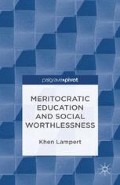Abstract
This chapter was originally intended to strictly summarize the critical arguments. However, I also discuss in it possible directions for dealing with worthlessness, according to a critical pedagogy logic.
Access this chapter
Tax calculation will be finalised at checkout
Purchases are for personal use only
Preview
Unable to display preview. Download preview PDF.
Notes
Dianna C. Coben, “Metaphors for an Educative Politics,” in C. Borg, J. Buttigieg, P. Mayo, Gramsci and Education, Lanham, MD: Rowman & Littlefield, 2002, 271–286.
One may fairly argue that rather the extra-formal sphere, as a social sphere, is where the class dynamic of power relationships takes place; and where discrimination, marginalization, racism, and chauvinism flourish. Such an argument was raised by researchers in the late 1980s, against the optimistic assumption of Habermas (Peter Miller, Domination and Power, Routledge, 1987) As regards education, this means that knowing children’s liveliness and vitality is insufficient, as they are placed in advance within a social inequality that informs the dialog with them. Any educational act toward containment and democratization should be based on a political stance aimed at the praxis of social change, in the same important aspects presented in critical pedagogy. While such arguments are crucial, I’ve avoided developing them in the present discussion, because according to my proposed analysis, we must first and foremost enable access to a sphere where the praxis of change can even take place; and the basis for such praxis can be acquaintance with pain and oppression
(Lampert, K., Empathic Education — A Critique of Neocapitalism, Resling, 2008).
M. W. Apple and J. A. Beane, Democratic Schools, Heinemann, 2nd edition, 2007.
Copyright information
© 2013 Khen Lampert
About this chapter
Cite this chapter
Lampert, K. (2013). The Difficulty of an Alternative. In: Meritocratic Education and Social Worthlessness. Palgrave Pivot, London. https://doi.org/10.1057/9781137324894_8
Download citation
DOI: https://doi.org/10.1057/9781137324894_8
Publisher Name: Palgrave Pivot, London
Print ISBN: 978-1-349-45908-7
Online ISBN: 978-1-137-32489-4
eBook Packages: Palgrave Education CollectionEducation (R0)

